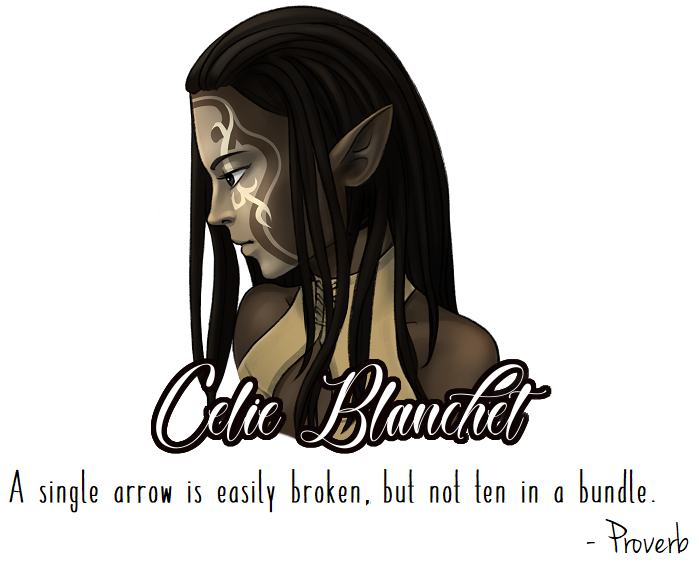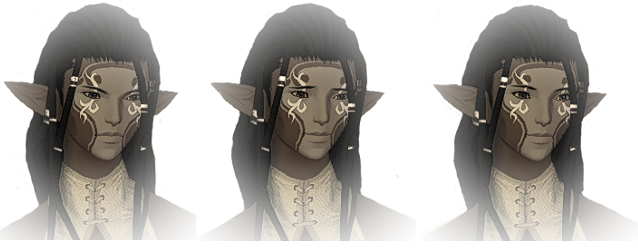Celie Blanchet
<tabs plain style="width: 850px; margin-left: 0px; font-size:12px; font-family:Trebuchet MS; text-align: justify; line-height: 1.8; color:#000000; font-size:12px; font-family:Georgia; letter-spacing:0.1em;">
The White Masks have long been the stuff of rumor in the South Shroud. They are most commonly looked down upon as the descendants of the Gelmorrans who had a visceral fear of change, those who chose to tarry and toil as their better cousins and the Hyur ascended from the darkness to live in what would become Gridania. The conjectures about them are many and varied — and as often wrong as they are right.
The White Masks do not sharpen their teeth. They are not cannibals partial to the flesh of Wildwoods. Perhaps the most prominent fact of the matter is they do not refer to themselves as White Masks at all.
The Blanchets boast theirs were the ancestors to hold out longest in Gelmorra . . . and every other family among the so-called "White Masks", without exception, would swiftly assert the same. What all can agree is that between them are some of the only pure Gelmorran lines left in Eorzea. To the men, women, and children of this faction, they are as much Gelmorrans as they've ever been. Nothing more, and certainly nothing less.
And yet.
And yet like Gelmorra, they would suffer population decay in time. Half their people remained loyal, but half had begun to run off together into the night for whatever refuge they could hope to find. Brother turned on brother, sons betrayed their own fathers, and for a time it seemed history would indeed repeat itself. Then the leader of the "Gelmorrans," a man named Mourefort, decreed that every child that should come of age within their ranks, they would impress the importance of their heritage upon them not only through story and song, but through indelible ink; a mask, he said, so they may never wear the likes of another.
After sightings of these distinctly white-masked Duskwights earned them their sobriquet, departure rates plummeted, and those that did leave were forced to travel far beyond the Twelveswood so as not to be recognized. Once in Menphina's blue moon, though, there would be such a soul emboldened enough to brave Gridania.
Celie Blanchent would come to count herself among those scarce few — just not of her own violition. It was after a harsh summer of near-constant assaults from a group of Wood Wailers and run-ins with roving beasts; it was after a summer where they had too little meat, and their withered crops had but a tiny rivulet that ran thinner by the day; it was after a summer where they dug more graves than they celebrated births that Celie's mother lost hope in their cause and fled with her two children. Through many lies about having been forced to remain with the White Masks, through denouncing their kith and kin, it is said... and the less gentle version of the tale pays mention to a certain few, ahem, favors to a Hearer and perhaps Wood Wailer or two. In the end, the family was permitted to reside in Gridania.
gfdsgfjfdl;gj gkdflkg dlfjfdjg fdlgjfdljg dfl;jdgj dlfgj;jg dfgjfdg dg;jf;lg dgfjfgg fdl;jgg df;ljgfd dfs;lfj dflgfjg fd;ljg d;ljgfgs fd;jgsdl;fg sd;lgj ;df;lgl;j ;ldsgl;j ldfgdg
By the book. A keeper of oaths. A stickler for the rules. These have all been used to describe Celie. She is a moral woman, but those morals do not operate independently of society. Established systems mean an established order to things. That which is done a certain way is done because it works. Even if things aren't ideal, they could always be worse, and unless shown beyond all reasonable doubt implementing change is for the better — for the needs of the many, not the needs of the few — Celie will typically deem unvetted solutions not as innovation, but haphazard risk-taking by those who can't see past the thrill of their imagination running wild. Less spoken of but as much considered is that failure would be a mark on her own record of reliability, and although Celie need be coerced to admit such a thing out loud and in so many words, some facets of her social standing are as important to her as anything else.
The moment Celie steps foot on new ground she wants to know who is charge, where they are, and what they need done. But her yield to these authorities is contingent on their adherence to the values she holds in such high esteem; it is vital that they demonstrate honesty, dedication, and competence. Truly her loyalty extends only so far as her respect does, and should her superior fall from grace through fault of their own (and sometimes not), they are liable to look up and see her back already turned no matter how many moons their partnership has endured.
"Lead me, follow me, or get out of my way" is taken well to heart. If need be — or just as often if no one asked — Celie naturally steps into leadership roles herself. Many would find her rigid, a micromanaging boss from the depths of the Hells sweating buckets about the details, but none could honestly critique the lengths she'll go through to keep her word, nor her overall efficiency, excepting her seeming inability or perhaps unwillingness to recognize the strengths of individuals she considers more effort than they're worth.
Yet Celie thrives as part of a team, and for those who have proven their work ethic, she will defend them as fiercely as she would her own principles against most any opposition — up to and including those who outrank them — if that opposition is thoroughly proven "wrong." She is also willing to listen criticism from those both "above" and "below" her on whatever ladder she's taken to climbing, though entertaining the suggestion does not mean she'll fulfill it.
- THIS
- IS
BARNABY SUX
HOW DO I REACH THESE KEEEDS
the end
I once killed a man with mouse pad, an empty bottle of Dawn, and a gun.
I'd like to thank myself, because I always believed in me. And Kanye West.
|
|
|
|











